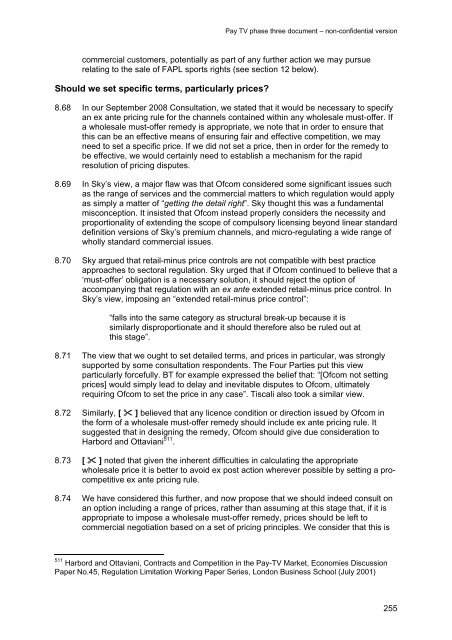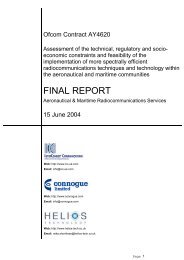Pay TV phase three document - Stakeholders - Ofcom
Pay TV phase three document - Stakeholders - Ofcom
Pay TV phase three document - Stakeholders - Ofcom
You also want an ePaper? Increase the reach of your titles
YUMPU automatically turns print PDFs into web optimized ePapers that Google loves.
<strong>Pay</strong> <strong>TV</strong> <strong>phase</strong> <strong>three</strong> <strong>document</strong> – non-confidential version<br />
commercial customers, potentially as part of any further action we may pursue<br />
relating to the sale of FAPL sports rights (see section 12 below).<br />
Should we set specific terms, particularly prices?<br />
8.68 In our September 2008 Consultation, we stated that it would be necessary to specify<br />
an ex ante pricing rule for the channels contained within any wholesale must-offer. If<br />
a wholesale must-offer remedy is appropriate, we note that in order to ensure that<br />
this can be an effective means of ensuring fair and effective competition, we may<br />
need to set a specific price. If we did not set a price, then in order for the remedy to<br />
be effective, we would certainly need to establish a mechanism for the rapid<br />
resolution of pricing disputes.<br />
8.69 In Sky’s view, a major flaw was that <strong>Ofcom</strong> considered some significant issues such<br />
as the range of services and the commercial matters to which regulation would apply<br />
as simply a matter of “getting the detail right”. Sky thought this was a fundamental<br />
misconception. It insisted that <strong>Ofcom</strong> instead properly considers the necessity and<br />
proportionality of extending the scope of compulsory licensing beyond linear standard<br />
definition versions of Sky’s premium channels, and micro-regulating a wide range of<br />
wholly standard commercial issues.<br />
8.70 Sky argued that retail-minus price controls are not compatible with best practice<br />
approaches to sectoral regulation. Sky urged that if <strong>Ofcom</strong> continued to believe that a<br />
‘must-offer’ obligation is a necessary solution, it should reject the option of<br />
accompanying that regulation with an ex ante extended retail-minus price control. In<br />
Sky’s view, imposing an “extended retail-minus price control”:<br />
“falls into the same category as structural break-up because it is<br />
similarly disproportionate and it should therefore also be ruled out at<br />
this stage”.<br />
8.71 The view that we ought to set detailed terms, and prices in particular, was strongly<br />
supported by some consultation respondents. The Four Parties put this view<br />
particularly forcefully. BT for example expressed the belief that: “[<strong>Ofcom</strong> not setting<br />
prices] would simply lead to delay and inevitable disputes to <strong>Ofcom</strong>, ultimately<br />
requiring <strong>Ofcom</strong> to set the price in any case”. Tiscali also took a similar view.<br />
8.72 Similarly, [ � ] believed that any licence condition or direction issued by <strong>Ofcom</strong> in<br />
the form of a wholesale must-offer remedy should include ex ante pricing rule. It<br />
suggested that in designing the remedy, <strong>Ofcom</strong> should give due consideration to<br />
Harbord and Ottaviani 511 .<br />
8.73 [ � ] noted that given the inherent difficulties in calculating the appropriate<br />
wholesale price it is better to avoid ex post action wherever possible by setting a procompetitive<br />
ex ante pricing rule.<br />
8.74 We have considered this further, and now propose that we should indeed consult on<br />
an option including a range of prices, rather than assuming at this stage that, if it is<br />
appropriate to impose a wholesale must-offer remedy, prices should be left to<br />
commercial negotiation based on a set of pricing principles. We consider that this is<br />
511 Harbord and Ottaviani, Contracts and Competition in the <strong>Pay</strong>-<strong>TV</strong> Market, Economies Discussion<br />
Paper No.45, Regulation Limitation Working Paper Series, London Business School (July 2001)<br />
255
















